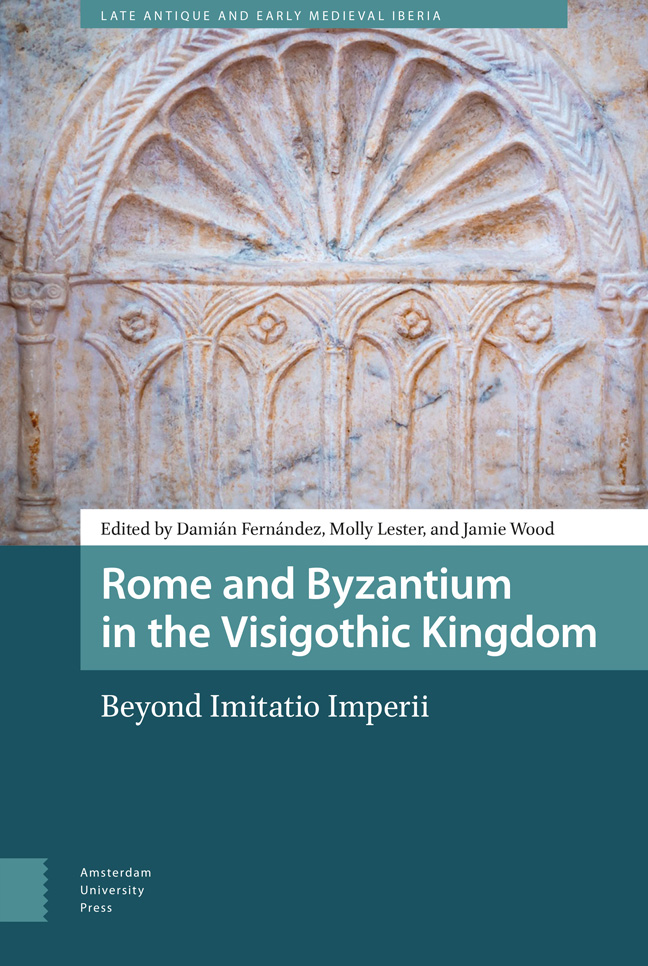Book contents
- Frontmatter
- Contents
- List of Figures and Tables
- Abbreviations
- Acknowledgements
- Maps
- Introduction
- 1 Visigothic Spain and Byzantium: The Story of a Special (Historiographical) Relationship
- 2 The Development of the Visigothic Court in the Hagiography of the Fifth and Sixth Centuries
- 3 Experiments in Visigothic Rulership: Minting and Monetary Reforms under Alaric II
- 4 A Comparison of Roman and Visigothic Approaches to Exile
- 5 The Roman Jewel in the Visigothic Crown: A Reassessment of the Royal Votive Crowns of the Guarrazar Treasure
- 6 Capitalhood in the Visigothic Kingdom
- 7 Making Rite Choices: Roman and Eastern Liturgies in Early Medieval Iberia
- 8 Ethnicity and Imitatio in Isidore of Seville
- 9 Re-imagining Roman Persecution in the Visigothic Passions
- 10 Romanness in Visigothic Hagiography
- 11 Empire and the Politics of Faction: Mérida and Toledo Revisited
- 12 The Agents and Mechanics of Connectivity: The Mediterranean World and the Cities of the Guadiana Valley in the Sixth Century
- 13 Staying Roman after 711?
- Index
Introduction
Published online by Cambridge University Press: 20 February 2024
- Frontmatter
- Contents
- List of Figures and Tables
- Abbreviations
- Acknowledgements
- Maps
- Introduction
- 1 Visigothic Spain and Byzantium: The Story of a Special (Historiographical) Relationship
- 2 The Development of the Visigothic Court in the Hagiography of the Fifth and Sixth Centuries
- 3 Experiments in Visigothic Rulership: Minting and Monetary Reforms under Alaric II
- 4 A Comparison of Roman and Visigothic Approaches to Exile
- 5 The Roman Jewel in the Visigothic Crown: A Reassessment of the Royal Votive Crowns of the Guarrazar Treasure
- 6 Capitalhood in the Visigothic Kingdom
- 7 Making Rite Choices: Roman and Eastern Liturgies in Early Medieval Iberia
- 8 Ethnicity and Imitatio in Isidore of Seville
- 9 Re-imagining Roman Persecution in the Visigothic Passions
- 10 Romanness in Visigothic Hagiography
- 11 Empire and the Politics of Faction: Mérida and Toledo Revisited
- 12 The Agents and Mechanics of Connectivity: The Mediterranean World and the Cities of the Guadiana Valley in the Sixth Century
- 13 Staying Roman after 711?
- Index
Summary
As western Roman society refashioned itself into multiple ‘little Romes’ in the fifth, sixth, and seventh centuries, the Visigothic kingdoms of Toulouse and Toledo actively preserved and transformed much of the Roman world that preceded them. They were not alone in this, as several other kingdoms, including the eastern Roman empire, explored the legacy of Rome while navigating the social, political, and economic shifts that accompanied the transition to the early medieval period. The ‘Romanness’ of such kingdoms, as well as what being Roman actually meant in the post-Roman west, frequently plays a pivotal role in debates about the ‘transformation’ of the Roman world, functioning for some scholars as a key marker of continuity and change across the period.
In post-Roman Iberia and southern Gaul, scholarly debate over the legacy of Rome in the Visigothic kingdom has long grappled with the survival of Roman (or so-called Germanic) identities and practices and with the importation of Roman traditions from other polities. To a large extent, the modern origins of this debate trace back to discussions of the nature of Visigothic institutions, particularly the controversy over the putative Roman or Germanic origins of Visigothic law. Those who stressed the Visigoths’ romanitas were also particularly interested in Visigothic relations with the empire in the east. As Céline Martin explores in her contribution to this volume, art historians and archaeologists have long spoken of a ‘Byzantine imprint’ on Iberian evidence, a characterization which scholars eventually extended to political culture as well. In the twentieth century, the political and diplomatic policies of the Francoist regime strongly shaped Spanish scholarly insistence on Iberian uniqueness within the western Mediterranean and on the markedly ‘imperial’ influences on Visigothic art, culture, and institutions. Outside of Spain, many Anglophone scholars argued for a strong imperial presence within the Iberian peninsula as well, such as P. D. King's statement that there are ‘plenty of examples […] of the constant Byzantine influence in practically every walk of Visigothic life’. For those advocating for imperial models, however, the source of these models was far less clear, and scholars debated whether the Visigoths drew on the late Roman empire, the Byzantine political centre of Constantinople, the ‘East’ more generally, or closer Byzantine societies such as Ravenna, southern Iberia, or northern Africa.
- Type
- Chapter
- Information
- Rome and Byzantium in the Visigothic KingdomBeyond Imitatio Imperii, pp. 17 - 28Publisher: Amsterdam University PressPrint publication year: 2023



